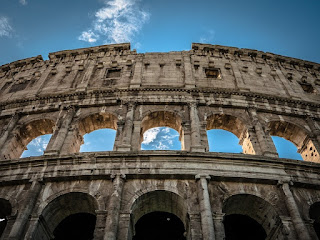 |
Colosseum Photo by Martieda at
https://pixabay.com/photos/colosseum-rome-italy-landmark-1799672/ |
This world history resource focuses on
ancient Rome and early Christianity from
500 B.C. to A.D. 500 and includes quiz questions
and answers and video links to related topics.
I utilized World History: Patterns of Interaction (Holt McDougal)
for our world history textbook.
It has multiple options for different learning styles
and covers a wide array of information.
This quiz accompanies Chapter 6: pages 152-185.
Directions for the quiz:
- Scroll down and click on the thumbnail to enlarge to full screen.
- Click on the graphic to advance to the next screen.
- Choose an answer for each question.
- Compare your answers with those provided.
If you are interested in a group and/or interactive version of this quiz,
log in to Kahoot! and search for Week 6 World History by Katrena.
Below are free videos to accompany chapter 6:
Thanks for visiting my StudentSurvive2Thrive blog.
Feel free to search for resources via the site map,
topics on the right or my search bar.
Below are some of my articles you may find helpful this week:
 |
| World History Week 6 Ancient Rome and Early Christianity 500 B.C. to A.D. 500 |
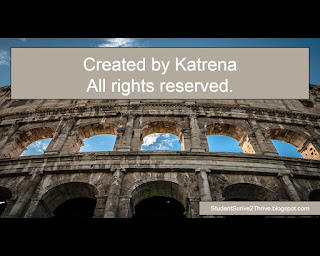 |
| Created by Katrena. All rights reserved. |
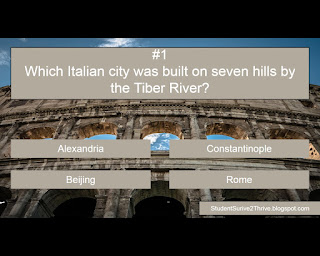 |
| Which Italian city was built on seven hills by the Tiber River? Answer choices include: Alexandria, Constantinople, Beijing, Rome |
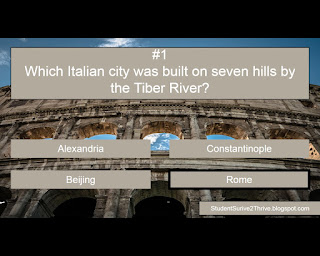 |
| The correct answer is Rome. |
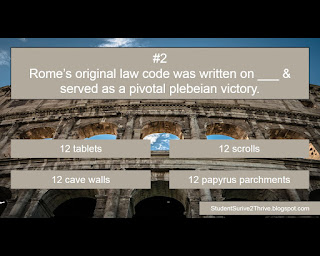 |
| Rome’s original law code was written on ___ & served as a pivotal plebeian victory. Answer choices include: 12 tablets, 12 scrolls, 12 cave walls, 12 papyrus parchments |
 |
| The correct answer is 12 tablets. |
 |
| Roman citizens who owned land were required to ____. Answer choices include: give 60% of their yield to the government, serve in the army, provide shelter for nomadic people, burn their field if they saw enemy troops |
 |
| The correct answer is serve in the army. |
 |
| Who was the 29-year-old general from Carthage who led an attack on Rome through the Alps in 218 B.C.? Answer choices include: Gaius Claudius Nero, Julius Caesar, Agasius, Hannibal Barca |
 |
| The correct answer is Hannibal Barca. |
 |
| Two brothers, ___ and ___, advocated for the poor in the Roman Empire. Answer choices include: Tiberius/Gaius, Jacob/Esau, William/Jacob, Atlas/Prometheus |
 |
| The correct answer is Tiberius/Gaius. |
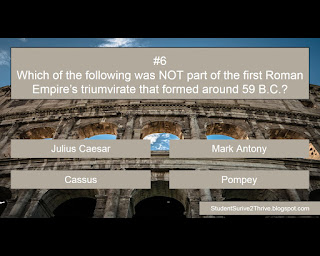 |
| Which of the following was NOT part of the first Roman Empire’s triumvirate that formed around 59 B.C.? Answer choices include: Julius Caesar, Mark Antony, Cassius, Pompey |
 |
| The correct answer is Mark Antony. |
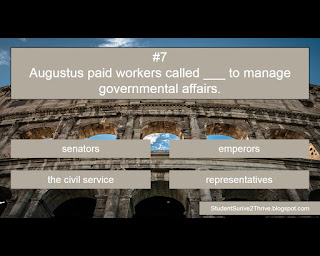 |
| Augustus paid workers called ___ to manage governmental affairs. Answer choices include: senators, emperors, the civil service, representatives |
 |
| The correct answer is the civil service. |
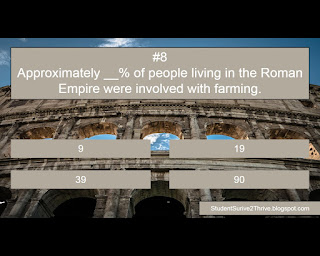 |
| Approximately __% of people living in the Roman Empire were involved with farming. Answer choices include: 9, 19, 39, 90 |
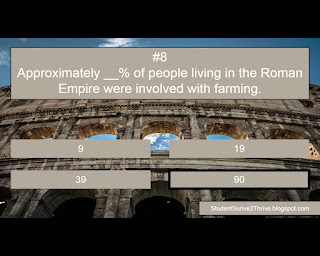 |
| The correct answer is 90. |
 |
| Approximately ___ of the Roman Empire population were enslaved people. Answer choices include: 1/3, 1/2, 2/3, 3/4 |
 |
| The correct answer is 1/3. |
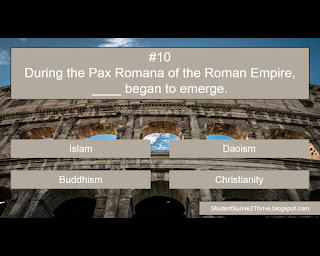 |
| During the Pax Romana of the Roman Empire, ____ began to emerge. Answer choices include Islam, Daoism, Buddhism, Christianity |
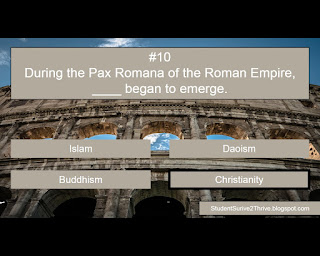 |
| The correct answer is Christianity. |
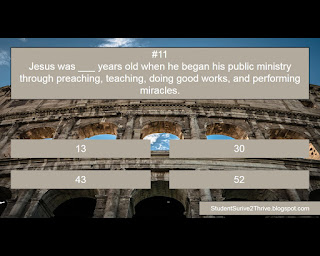 |
| Jesus was ___ years old when he began his public ministry through preaching, teaching, doing good works, and performing miracles. Answer choices include 13, 30, 43, 52 |
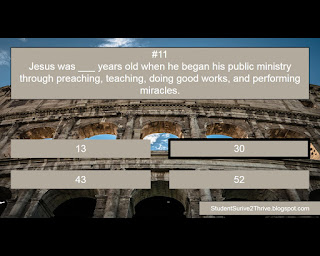 |
| The correct answer is 30. |
 |
| After the fall of Jerusalem & destruction of their temple, the ___ began in which the Jews fled to many different parts of the world. Answer choices include Crusades, Holocaust, Exodus, Diaspora |
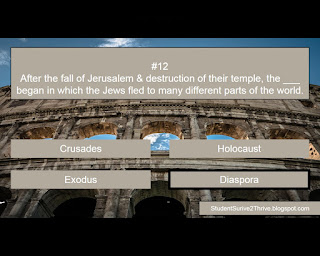 |
| The correct answer is Diaspora. |
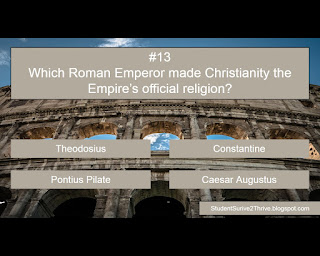 |
| Which Roman Emperor made Christianity the Empire’s official religion? Answer choices include Theorosius, Constantine, Pontius Pilate, Caesar Augustus |
 |
| The correct answer is Theodosius. |
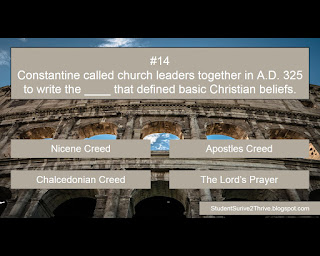 |
| Constantine called church leaders together in A.D. 325 to write the ____ that defined basic Christian beliefs. Answer choices include the Nicene Creed, Apostles Creed, Chalcedonian Creed, The Lord's Prayer |
 |
| The correct answer is Nicene Creed. |
 |
| In the third century A.D., the Roman Empire experienced a drastic drop in the value of money combined with increasing prices, called ____. Answer choices include inflation, deflation, stagflation, assassination |
 |
| The correct answer is inflation. |
 |
| In A.D. 330, the reigning ruler moved the Roman Empire’s capital from Rome to Byzantium, which was later called ____. Answer choices include Constantinople, Cologne, Pompeii, Alexandria |
 |
| The correct answer is Constantinople. |
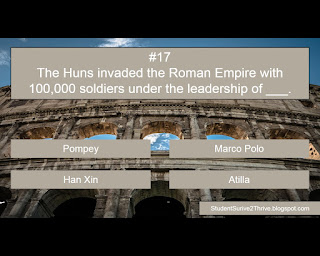 |
| The Huns invaded the Roman Empire with 100,000 soldiers under the leadership of ___. Answer choices include Pompey, Marco Polo, Han Xin, Atilla |
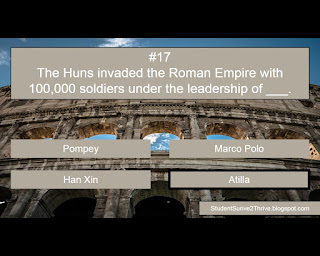 |
| The correct answer is Atilla. |
 |
| What happened in A.D. 79 to destroy Pompeii? Answer choices include: The Huns burned the city to the ground. Mt. Vesuvius erupted & covered it with ash. The sea flooded the city. An earthquake destroyed the city. |
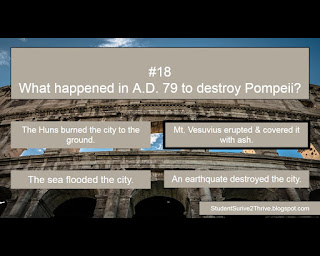 |
| The correct answer is: Mt. Vesuvius erupted & covered it with ash. |
 |
| ____ was the language of the Romans and the official language of the Roman Catholic Church. Answer choices include Sanskrit, Greek, Latin, Hebrew |
 |
| The correct answer is Latin. |
 |
| Which of the following was NOT a principal of Roman law? Answer choices include: All citizens had the right to equal treatment. A person was considered guilty until proven innocent. The burden of proof rested with the accuser. A person should be punished for actions & not thoughts. |
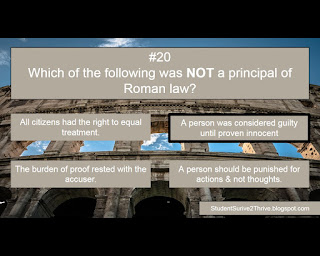 |
| The correct answer is: A person was considered guilty until proven innocent. |
 |
| Find more resources at StudentSurvive2Thrive.blogspot.com |












































No comments:
Post a Comment
Thanks for reading my article and sending your comment! Please note that I do not place links to other web sites on this blog.
Note: Only a member of this blog may post a comment.